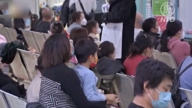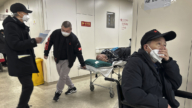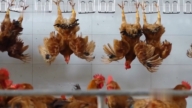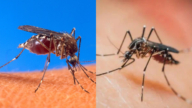【新唐人2014年02月17日讯】中共官媒公布的资料显示,截至2月10号,中国大陆已经确诊H7N9的患者为185人,死亡47人。不过,比表面数字看起来更为严重的是,广州市场从2月15号开始,所有活禽市场关闭两个星期,而浙江杭州市把主城区的活禽市场永久性关闭。人们担心的是,今年的H7N9禽流感会超过2003年的“非典”(SARS)吗?请看报导。
由于广东H7N9禽流感的感染者不断增加,广州当局决定,从2月15号开始,广州活禽市场关闭两个星期。
广东省疾控部门15号的通报声称,广州又新增两例人类感染H7N9禽流感病例,其中79岁的老翁,病情危重。
统计显示,自去年8月,惠州通报首例H7N9病例以来,广东已经确诊70例人类感染H7N9禽流感病例,14人死亡。
浙江杭州控制H7N9禽流感的条件更为苛刻。
杭州当局14号发布了《建立人感染H7N9禽流感源头防控长效机制的实施办法》,根据这一“实施办法”,杭州的上城区、下城区及西湖区等主城区,不再重新开启活禽交易。此外,萧山区、余杭区的花鸟活禽市场将继续休市3个月。
杭州当局的新规定还说,对于那些仍进行活禽交易的专业市场,城市区县农贸市场,农村集市则要采取更严格的卫生管理措施。
据浙江省12号的通报,今年浙江省已累计感染H7N9禽流感病的人数为84例,高居全国之首﹔仅1月份就有61例,其中17人死亡。
浙江维权人士赵先生:“其实,我们一个诸暨市就有30几个人已死掉了,死了几百个人也不知道而已。你死了几百个他说死了30几个,电视上放出来的都是假的。”
据浙江公开的确诊H7N9禽流感人数显示,杭州和宁波占据前两位,而诸暨市是绍兴市的一个县级市,人口约占绍兴的1/5。
美国中文媒体《大纪元》记者在一月底就获知,浙江省H7N9禽流感的严重性远超中共官方公布的,杭州市第一医院感染科已经没有病床,住院需要先预约﹔宁波的一家医院甚至有几百人排队等待住院。
上海市一位医生也对美国《大纪元》新闻网表示,H7N9禽流感的检测费用高达3000元,有很多患者根本负担不起,所以实际确诊病例的数据并不准确,更多患者没有进行检测,而上海市卫生部门也对各医院下达了不要上报的通知,所以导致报告病例数很少。
有北京市民透露,现在北京市已经准备好了军队,一旦H7N9禽流感疫情不能控制,就会像2003年处理SARS那样处理。
中共官媒的报导声称,截至2月10号,大陆今年H7N9禽流感确诊超180例,死亡47人,除了浙江和广东以外,北京、上海、江苏、安徽、福建、湖南、贵州等省份,都出现了死亡病例。但每天H7N9确诊病例以5至7例规模继续增长。
杭州市民魏祯凌表示,虽然老百姓担心禽流感,但好像并不很怕。因为中国不仅是禽流感问题,空气污染、毒食品等都是问题,老百姓已经防不胜防了。
浙江杭州市民魏祯凌:“中国的老百姓就是这个心态吧,过一天算一天,今天没事就算阿弥陀佛了。因为生活中在这个社会中,危及健康的因素太多了。”
其实,在大陆以外,H7N9禽流感也有扩散的趋势。
12号,香港确认了第5例人感染H7N9禽流感病例,目前患者病情危急,去年12月,则有一名来自深圳感染H7N9病毒的80岁男子,在香港死亡﹔而台湾疾病控制中心13号也声明,一名来自中国江苏的老年游客,12月在台被确诊感染了H7N9病毒,目前仍在台湾住院治疗。
越南动物卫生部门15号发布消息说,另一型H5N1型禽流感在越南继续蔓延,目前全越南已有8个省份出现疫情,而平福省近两个月有两人因感染H5N1禽流感而死亡。
春季是禽流感的爆发季节,2014年的禽流感会不会超过2002底爆发的“非典”,这正是人们所担心的。
采访/朱智善 编辑/宋风 后制/孙宁
Will China’s H7N9 Epidemic Be Comparable to SARS?
Chinese Communist Party (CCP) official
data confirms that up to February 10, there
have been 185 cases of H7N9, with 47 deaths.
All live poultry markets in Guangzhou are
closed for two weeks, as of February 15.
Hangzhou City in Zhejiang Province has permanently
closed all live poultry markets in metropolitan area.
These are thought to indicate a more serious situation.
Will the severity of H7N9 exceed that of SARS in 2003?
The following is our report.
With the number of victims of H7N9 continuing to increase,
Guangzhou authorities have been forced to close live
poultry markets for two weeks, which began on February 15.
On February 15, Guangdong Provincial CDC
reported two new cases of the H7N9 infection.
A 79-year-old man is reported to be in a critical condition.
Data shows that since the first case of H7N9 was reported
last August in Huizhou, there have been 70 confirmed
cases in Guangdong, with 14 dying of the infection.
Hangzhou City in Zhejiang Province has
conducted stringent controls for H7N9.
According to regulations issued by Hangzhou’s
authorities on February 14, three main districts
have permanently closed all live poultry markets.
Two other districts have closed markets for three months.
Hangzhou’s regulations also demand stringent hygiene
management to any markets remaining open in the city.
A Zhejiang Provincial briefing published on February 12
indicates there have been a total of 84 H7N9 cases this year.
This ranks it highest across China. Of the
cases reported in January, 17 people died.
Mr. Zhao, Zhejiang activist: “In fact, more
than 30 people in our city, Zhuji, have died.
It could be several hundred, but they told you
it’s 30, and all the reported numbers are false.”
According to the number of confirmed H7N9 cases in
Zhejiang, Hangzhou and Ningbo have the highest number.
Zhuji is a county-level city in Shaoxing, with the
population making up about 1/5 of the Province.
The Epoch Times was notified at the end of January
that the severity of H7N9 cases in Zhejiang Province
was far more more than what was officially published.
The Infectious Diseases Department of Hangzhou
First Hospital has run out of beds in it’s wards.
Patients are placed onto waiting lists to stay in the hospital.
The waiting list has reached several
hundred in a Ningbo hospital.
A doctor in Shanghai told the Epoch Times that
the cost for H7N9 tests are as high as 3,000 yuan.
Many patients cannot afford these costs.
Therefore, the actual confirmed cases
does not represent the actual situation.
The Shanghai health sector has notified regional hospitals
not to report cases, which resulted in fewer cases known.
Beijing residents have revealed that
the army has been prepared in Beijing.
It will apply control measures similar to those seen in the
SARS epidemic in 2003, in case of widespread outbreak.
Chinese state-controlled media reported
that as of February 10, more than 180
cases have been reported in the country.
A total of 47 deaths are reported from
Zhejiang, Guangdong, Beijing, Shanghai,
Jiangsu, Anhui, Fujian, Hunan, and Guizhou.
The number of confirmed cases of H7N9
continues to grow daily by between 5 and 7.
Hangzhou resident Wei Zhenling said
that people don’t seem to care much.
Even though they are concerned with the bird flu,
they are approaching it like air pollution and toxic food.
They have no way to prevent it from happening.
Wei Zhenling, Hangzhou resident: “That’s
the mentality of the people in China today.
They take it one day at a time,
as long as everything is still ok.
There are just too many risks in this Chinese society.”
It also seems that H7N9 avian influenza
has spread outside of China.
On February 12, Hong Kong confirmed a
case of H7N9, who is still in a critical condition.
Last December, an 80-year-old man infected with
H7N9 virus from Shenzhen died in Hong Kong.
Taiwan’s CDC also reported on February 13 that a tourist
from Jiangsu, China, was confirmed with H7N9 infection.
This tourist remained hospitalized in Taiwan.
Information released from the Vietnam animal health
department said that on the February 15, another
type of avian flu, H5N1, has spread in Vietnam.
As many as eight provinces in Vietnam
have identified infected people.
Two people have died in in Binh Phuoc Province.
Avian flu tends to break out in the Spring.
There is concern that avian flu in 2014 may be more
severe than the outbreak of SARS in 2002/ 2003.
Interview/ZhuZhishan Edit/ SongFeng Post-Production/ SunNing






























